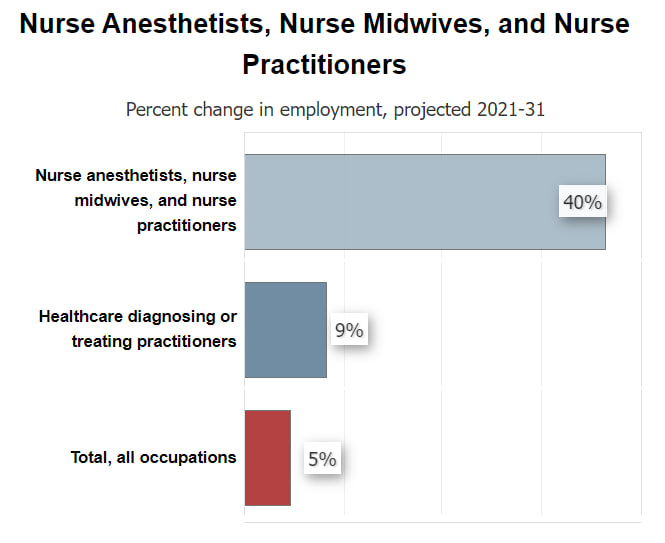Demand for Nurse Anesthetists on the Rise: A Look at the Job Market

As healthcare continues to evolve, the role of nurse anesthetists is becoming increasingly vital. Nurse anesthetists are advanced practice nurses who administer anesthesia during surgical, diagnostic, and therapeutic procedures. They play a critical role in ensuring patient safety and comfort throughout these procedures.
It is important to understand the job outlook for nurse anesthetists due to the increasing demand for their services. In this article, we will explore the current job market for nurse anesthetists, including statistics on job growth and areas with high demand. We will also compare the job outlook for nurse anesthetists to other healthcare professions.
Current Job Market for Nurse Anesthetists
The job market for nurse anesthetists is strong and continues to grow. According to the Bureau of Labor Statistics, employment of nurse anesthetists is projected to grow 40% from 2021 to 2031, much faster than the average for all occupations. This growth is due to several factors, including an increase in the number of surgical procedures being performed, an aging population in need of healthcare services, and the expansion of healthcare facilities and services in rural areas.

Source: U.S. Bureau of Labor Statistics, Employment Projections program
Areas with high demand for nurse anesthetists include hospitals, ambulatory surgery centers, and physician offices. In addition, there is a growing need for nurse anesthetists in the military, where they provide anesthesia care to service members in various settings.
When compared to other healthcare professions, the job outlook for nurse anesthetists is very promising. According to the Bureau of Labor Statistics, employment of nurse anesthetists is growing much faster than the average for all occupations, and the median annual wage for nurse anesthetists is significantly higher than the median wage for all occupations.
Factors Driving Demand for Nurse Anesthetists
The demand for nurse anesthetists is driven by several factors. One of the primary factors is the increase in surgical procedures being performed. As surgical procedures become more common, there is a greater need for anesthesia providers to ensure patient safety and comfort. Nurse anesthetists are often the primary providers of anesthesia care in surgical settings, making their role critical to the success of these procedures.
Another factor driving demand for nurse anesthetists is the aging population. As people age, they require more healthcare services, including surgical procedures that may require anesthesia. Nurse anesthetists are uniquely qualified to provide anesthesia care to older adults, who may have more complex medical needs and require specialized care.
In addition to the increase in surgical procedures and aging population, there is also a growing need for healthcare services in rural areas. Nurse anesthetists play a key role in expanding access to healthcare in these areas by providing anesthesia care in rural hospitals, clinics, and other healthcare facilities.
Education and Certification Requirements for Nurse Anesthetists
To become a nurse anesthetist, individuals must complete a master's degree in nursing with a focus on anesthesia. This typically takes two to three years of full-time study. In addition to the educational requirements, nurse anesthetists must also obtain certification from the National Board of Certification and Recertification for Nurse Anesthetists (NBCRNA).
Maintaining certification and continuing education is essential for nurse anesthetists to stay competitive in the job market. The NBCRNA requires nurse anesthetists to recertify every four years, which involves completing continuing education courses and demonstrating competency in anesthesia practice. In addition, many states require nurse anesthetists to obtain a certain number of continuing education credits each year to maintain their license to practice.
Salary and Benefits for Nurse Anesthetists
Nurse anesthetists are highly skilled healthcare professionals and are compensated accordingly. According to PayScale, the median annual salary for nurse anesthetists is $173,262, with the top 10% earning more than $193,000 per year. In addition to a competitive salary, nurse anesthetists often receive benefits such as health insurance, retirement plans, and paid time off.
It's important for nurse anesthetists to negotiate their salary and benefits when accepting a job offer. Negotiating can help ensure that they are being fairly compensated for their skills and experience.

Photo: Dim Hou/Unshlash
In conclusion, the demand for nurse anesthetists is expected to continue to grow in the coming years. Nurse anesthetists are compensated well for their skills and experience and have opportunities for career advancement within the field. Aspiring nurse anesthetists should stay informed about the job outlook for healthcare professions and consider pursuing this rewarding career path.
- Nurse anesthetists are highly skilled healthcare professionals who play a critical role in anesthesia care.
- The job outlook for nurse anesthetists is positive, with a projected job growth rate of 40% from 2021 to 2031.
- Factors driving demand for nurse anesthetists include an increase in surgical procedures, an aging population, and an expansion of healthcare facilities and services in rural areas.
- Nurse anesthetists receive a competitive salary and benefits, with a median annual salary of $173,262.
- Negotiating salary and benefits is important when accepting a job offer as a nurse anesthetist.
FAQ
What are the skills required to be a successful Nurse Anesthetist?
Successful Nurse Anesthetists need to possess strong clinical skills, critical thinking skills, attention to detail, communication skills, and the ability to work well under pressure. They must also have a deep understanding of anesthesia techniques and pharmacology, as well as knowledge of various medical procedures.
What is a typical day like for a Nurse Anesthetist?
A typical day for a Nurse Anesthetist involves preparing patients for anesthesia, administering anesthesia during medical procedures, monitoring patients' vital signs and responses to anesthesia, and managing patients' pain and anxiety before and after procedures. They may also consult with other healthcare professionals, review patients' medical histories, and develop anesthesia plans tailored to each patient's specific needs.
What are the work hours like for Nurse Anesthetists?
Nurse Anesthetists often work long and irregular hours, including nights, weekends, and holidays. They may also be called upon to respond to emergency situations outside of regular working hours.
What are the career advancement opportunities for Nurse Anesthetists?
Nurse Anesthetists may have opportunities to advance their careers by taking on leadership roles, pursuing advanced degrees, or specializing in a particular area of anesthesia practice. They may also have the opportunity to teach or mentor other healthcare professionals or to conduct research in the field of anesthesia.